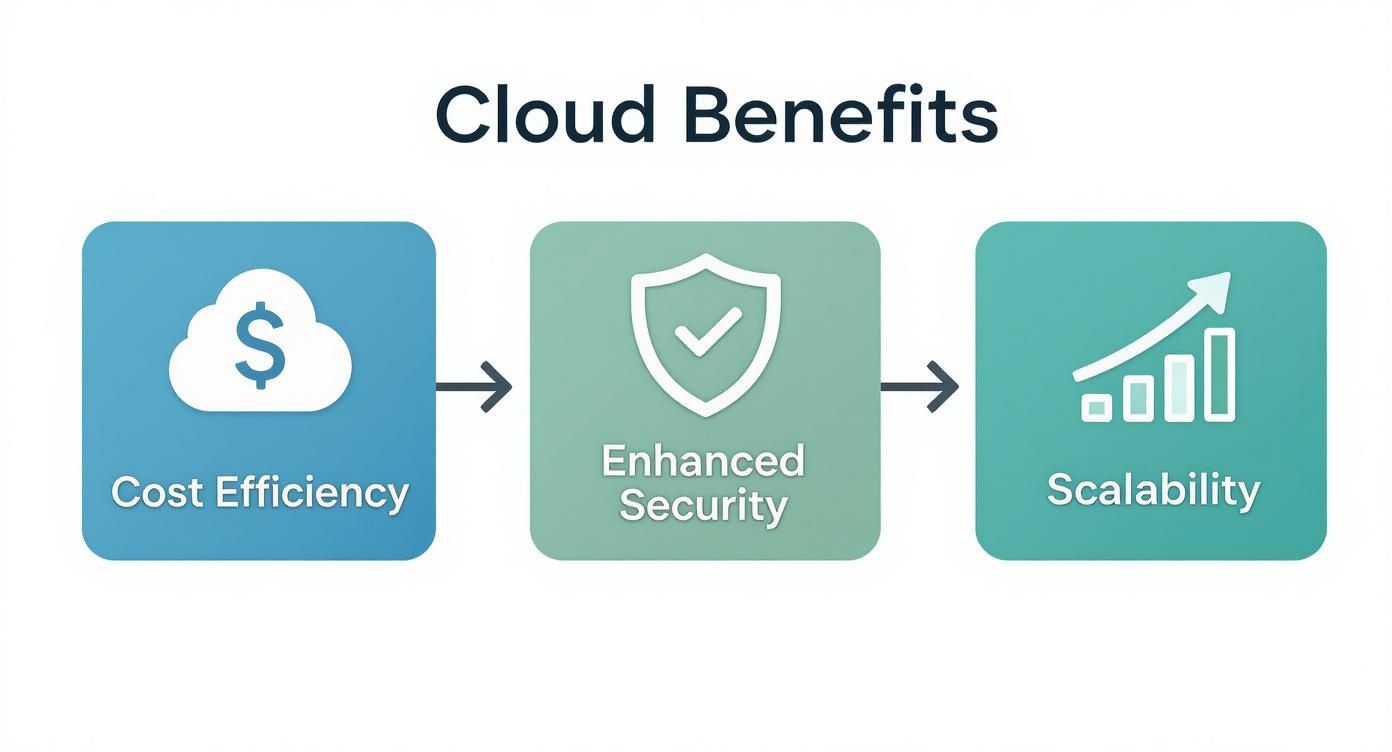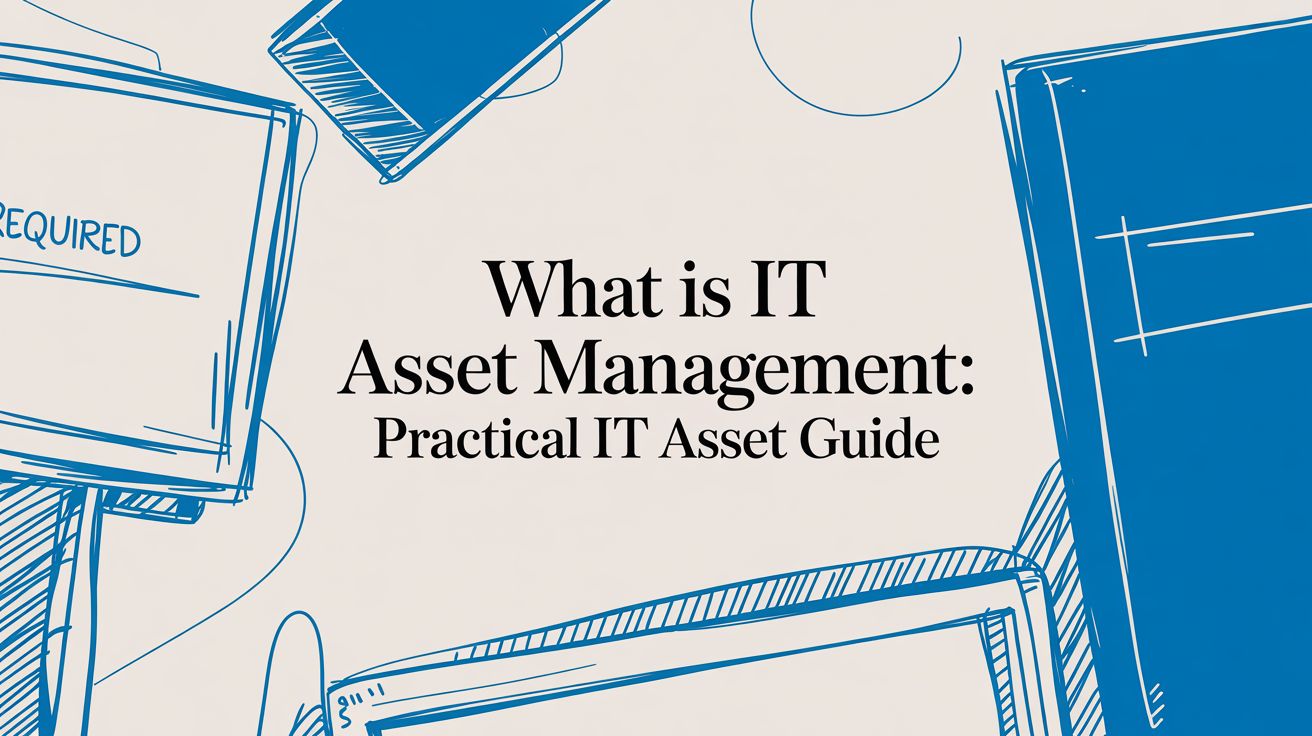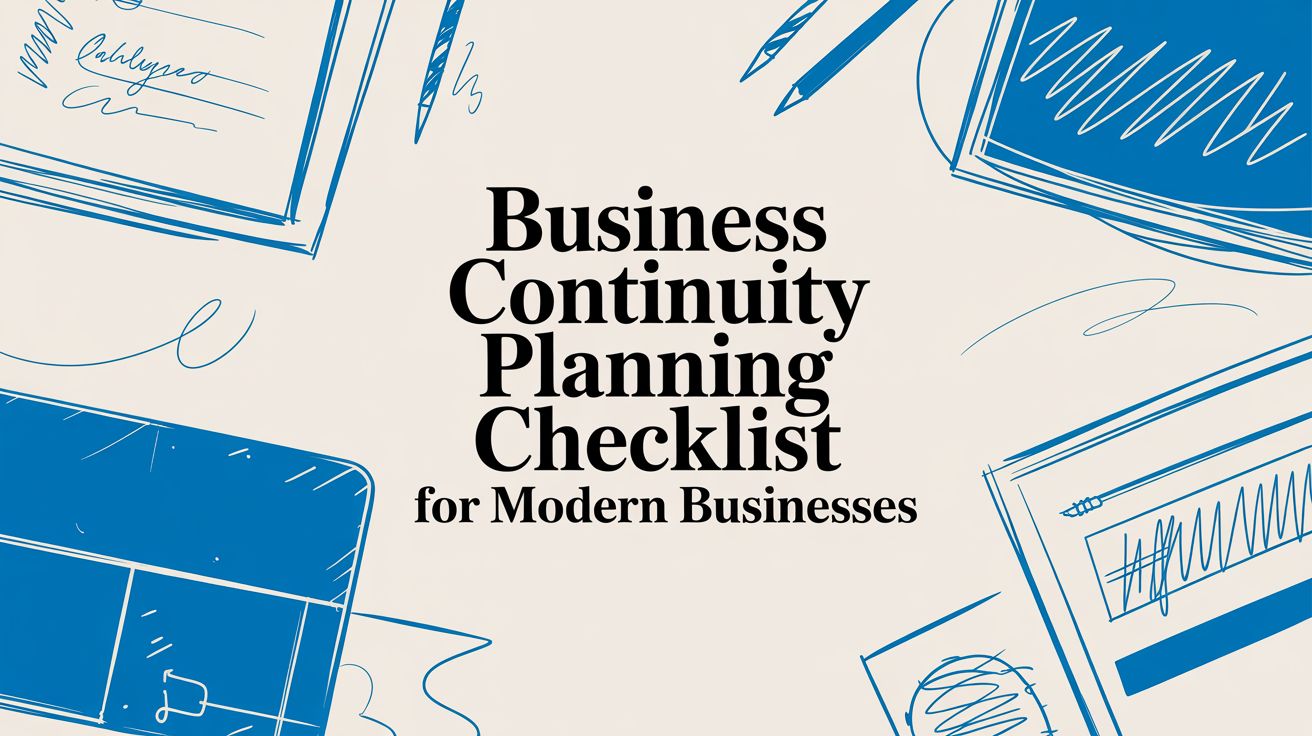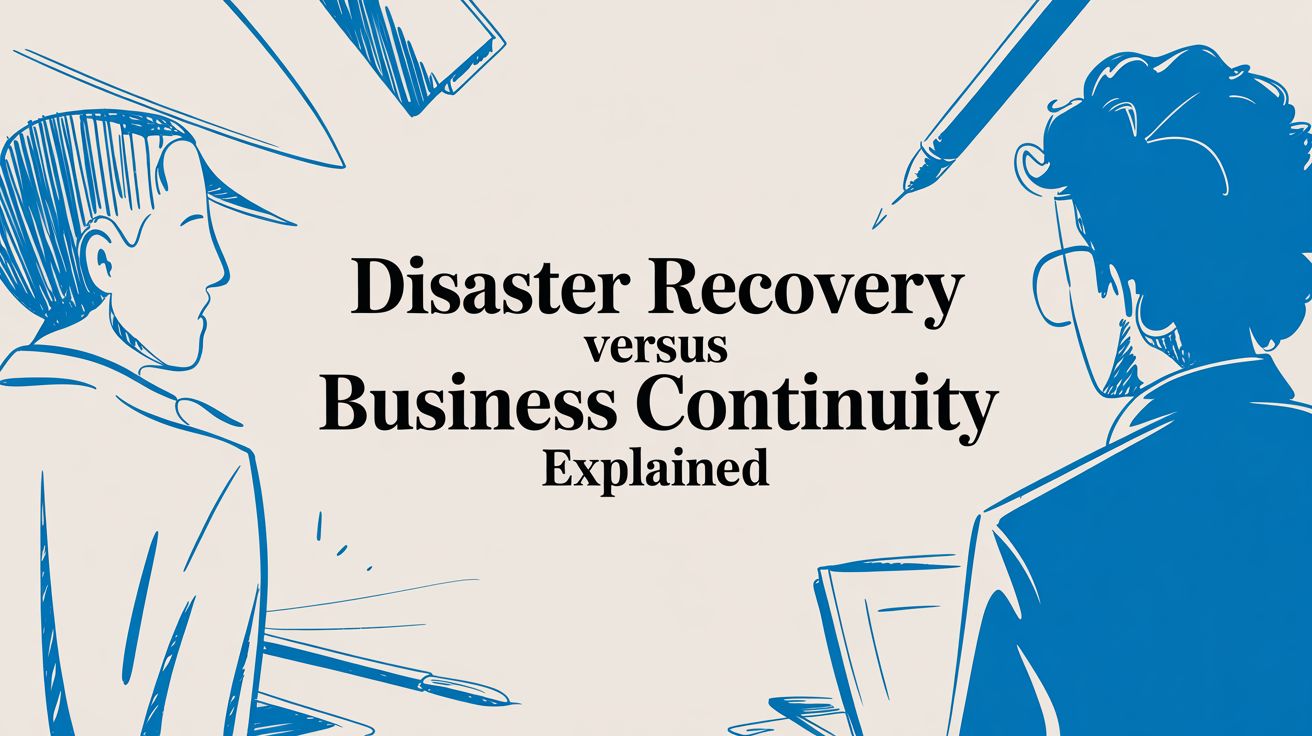How Cloud Managed Services Drive Business Growth
Cloud managed services are about bringing in a dedicated expert to handle your entire cloud environment. Think of it as a strategic partnership where a third-party provider takes the reins of your cloud infrastructure—your servers, software, security, and all the support that goes with it. This isn't just about fixing things when they break; it's a proactive approach that makes your IT a powerful asset for business growth.
Unpacking Cloud Managed Services
Imagine you own a high-performance race car, but you're not a master mechanic. Instead of trying to build a full-time pit crew from scratch, you'd partner with a specialized firm that handles all the tuning, maintenance, and security checks around the clock. That's a perfect analogy for cloud managed services. An expert provider, often called an MSP (Managed Service Provider), essentially becomes an extension of your team, making sure your cloud environment is finely tuned, secure, and always ready to perform.
This partnership goes far beyond basic remote IT support. You're entrusting the entire lifecycle of your cloud operations—from the initial design and migration to day-to-day monitoring and cybersecurity—to specialists. This is a game-changer for small and mid-sized businesses in places like Dallas and Memphis, giving them access to the kind of enterprise-grade IT management that was once only affordable for large corporations.

From Reactive Fixes to Proactive Strategy
The old way of doing IT was to wait for something to go wrong. A server crashes, an application stops working, or worse, a ransomware attack happens. Only then does someone scramble to fix it. This reactive "break-fix" approach is a recipe for expensive downtime, lost productivity, and unacceptable risk.
Cloud managed services completely flip that script. The entire model is built to get ahead of problems before they can impact your business. This is achieved through a few core functions:
- Constant Monitoring: Your MSP keeps a vigilant eye on your network, servers, and applications 24/7. They use sophisticated tools to spot anomalies and potential red flags long before they escalate into critical issues.
- Layered Security Management: This is crucial. It covers everything from managing firewalls and deploying endpoint protection (EDR/MDR) to running vulnerability scans and responding to cyber threats the moment they appear.
- Data Backups & Business Continuity: A quality MSP ensures your critical data is backed up reliably and can be restored quickly. This is the bedrock of a solid business continuity plan, designed to keep you operational no matter what—from a power outage to a cyberattack.
- Performance Optimization: Your provider constantly fine-tunes your cloud resources. The goal is to make sure your applications run smoothly and efficiently, preventing bottlenecks and ensuring you only pay for the resources you actually need.
By proactively managing your cloud infrastructure, an MSP aligns your technology directly with your business goals, turning IT from a cost center into a predictable driver of growth.
The Real-World Impact for Your Business
Let's look at a practical example. A small accounting firm in Dallas decides to migrate its entire operation to Microsoft 365. Initially, they try to manage it all themselves. They quickly find themselves overwhelmed, struggling with complex security settings, user permissions, and ensuring their client data is compliant and backed up correctly.
Frustrated, they partner with an MSP for cloud managed services. The provider immediately gets to work, implementing multi-factor authentication, setting up advanced threat protection, and creating an automated, tested backup system. The result? The firm reduced its cybersecurity risks significantly and freed up its team to focus on serving clients instead of wrestling with IT headaches. This is a common story of how a managed partnership delivers tangible business value.
Of course, a key first step is understanding the difference between keeping your tech on-site versus in the cloud. You can dive deeper with this detailed cloud vs. on-premise comparison to get a clearer picture. It also helps to get familiar with the different types of cloud services available to understand the technology powering it all.
Why Outsourcing Your Cloud Management is a Game-Changer
When you hand over your cloud management to a managed service provider (MSP), you’re not just offloading tasks—you’re unlocking measurable value that sharpens your competitive edge. For small and mid-sized businesses, this move transforms IT from a reactive cost center into a powerful tool for growth. The advantages boil down to three key areas: predictable costs, enterprise-grade security, and the flexibility to scale on your terms.
This isn't just a fleeting trend. The global market for cloud managed services is on a tear, expected to jump from about $46.5 billion in 2019 to a massive $171.17 billion by 2033. That explosive growth is driven by businesses realizing they need a smarter way to manage IT complexity and control costs without sacrificing performance or security.
Get Predictable Costs and a Better ROI
One of the first benefits you'll notice is financial stability. Instead of facing massive, unexpected bills for new servers, software, or emergency fixes—what we call capital expenses (CapEx)—you move to a predictable monthly operational expense (OpEx). This makes budgeting far easier and frees up capital you can reinvest into growing your business.
Consider a Dallas-based logistics company we worked with. They were constantly battling fluctuating IT costs. One month it was a server crash that cost them thousands; the next, they had to pay for new security software after a malware scare. Once they partnered with an MSP, those wild swings disappeared, replaced by one flat monthly fee.
The result? They slashed their total IT overhead by nearly 30% in the first year alone. All while getting access to better technology and expert support they could never have afforded on their own. That new financial stability meant they could finally invest in expanding their delivery fleet.
Before we dive into security and scalability, let's look at a quick side-by-side comparison. It really highlights the fundamental differences between the old way and the new.
In-House IT vs. Cloud Managed Services Comparison
This table shows just how stark the contrast is. An MSP model is built for the agility and financial predictability that modern businesses need.
Access Enterprise-Grade Security and Compliance
Let's be honest—for most small and mid-sized businesses, building an internal cybersecurity team that can stand up to modern threats is nearly impossible. Cybercriminals are constantly evolving their tactics, and staying ahead of them demands constant vigilance and very expensive, specialized tools like EDR (Endpoint Detection and Response). An MSP delivers this level of protection as a core part of their service.
This is much more than just installing antivirus software. A quality provider brings a multi-layered security strategy to the table, including:
- 24/7 Threat Monitoring: Real security experts are watching your network around the clock, ready to respond instantly to anything suspicious.
- Advanced Endpoint Protection: Every device, from your servers down to your team's laptops, gets locked down with sophisticated threat detection and response capabilities.
- Compliance Management: If you’re in a regulated field like healthcare (HIPAA) or finance, an MSP helps ensure your cloud environment meets all the strict legal requirements, protecting you from crippling fines.
This proactive stance drastically lowers your risk of a data breach, which can be financially devastating. You can explore the benefits of outsourced IT support to see just how deep this security-first approach goes.
Scale Your Operations On-Demand
Your business isn't static, so why should your IT be? You might experience a seasonal rush, launch a new product, or hire a dozen new employees. With a managed cloud, your infrastructure grows right alongside you—instantly.
Need more server power to handle a Black Friday sales spike on your website? Your MSP can add it in minutes. Things slowing down in the offseason? You can scale back just as quickly.
This elasticity means you only ever pay for what you actually use. No more wasting money on servers that sit idle, and no more frustrating slowdowns because you're under-provisioned. It gives your business the agility to pounce on new opportunities without being held back by clunky, rigid technology.
What's Included in a Managed Cloud Service Package?
When you partner with a managed cloud provider, you're not just buying a single product; you're investing in a comprehensive suite of services designed to keep your technology running smoothly, securely, and efficiently. It’s about turning your tech from a constant headache into a genuine business advantage. So, what exactly should you expect to find inside a good managed services agreement?
This infographic breaks down the core pillars of cloud managed services, showing how they connect directly to tangible business results like better security, cost savings, and the ability to grow without friction.

As you can see, these benefits aren't isolated. They all work together, creating a stronger, more adaptable foundation for your entire business.
Proactive Monitoring and Maintenance
The old "break-fix" IT model is dead. Waiting for something to go wrong before you call for help is a surefire way to lose money and productivity. Modern cloud managed services are built on a proactive foundation, using sophisticated tools to keep an eye on your entire cloud environment 24/7.
This constant watch means potential problems—like a server hitting its memory limit or a strange spike in network activity—get spotted and fixed before they can ever affect your team. It's the difference between a smooth, productive workday and a sudden, frustrating halt due to a preventable glitch.
Data Backup and Disaster Recovery
Many business owners think having a data backup is the same as having a disaster recovery plan. It isn't. A backup is just a copy of your files, which is critical, but it's only one piece of the puzzle. A true disaster recovery plan is the complete playbook for getting your entire business back up and running after a catastrophe, whether that's a flooded server room, hardware failure, or a ransomware attack.
A great managed service provider doesn't just back up your data; they build and test a full recovery process. The real goal is business continuity, ensuring you can get back to work with as little disruption as possible.
Consider this real-world scenario: a Memphis-based accounting firm we know had a server die right in the middle of tax season. It could have been catastrophic. But because their managed services partner had implemented a robust disaster recovery plan, their entire system was restored from a cloud replica. The team was back online in under an hour, avoiding what could have been days of crippling downtime and lost revenue.
Cybersecurity and Compliance Management
In a world filled with digital threats, top-notch security is non-negotiable. A Managed Service Provider (MSP) brings enterprise-level cybersecurity tools and expertise that most small or mid-sized businesses simply couldn't afford on their own. This isn't just about installing antivirus software; it's a deep, multi-layered defense strategy.
Here’s what that typically looks like:
- Advanced Endpoint Protection: Every device that touches your network—laptops, servers, even mobile phones—is locked down with sophisticated threat detection and response tools (EDR).
- Active Threat Hunting: Instead of just waiting for an alarm to go off, security experts are actively searching your network for hidden vulnerabilities or signs of an intruder. This proactive stance stops attacks before they start.
- Compliance Management: If you're in an industry like healthcare (HIPAA) or finance, you know the rules are strict. An MSP helps ensure your cloud setup meets all data protection standards, helping you steer clear of massive fines and legal headaches.
This security-first mindset is essential for protecting your most valuable asset: your data.
Dedicated Helpdesk Support
Even with the best proactive care, people will still have questions and run into the occasional IT snag. That's where a responsive, expert helpdesk comes in. This is a core part of any good managed services agreement. We're not talking about a generic call center; you get a team of skilled technicians who know your systems inside and out and can solve problems fast.
This kind of dedicated support empowers your employees by removing technology roadblocks, letting them focus on what they do best. A forgotten password or a software bug shouldn't derail an entire afternoon. Having an expert just a phone call or a message away is a cornerstone of effective infrastructure and cloud solutions built for modern business.
How Cloud Managed Services Solve Real Business Problems
It’s one thing to talk about cloud managed services in theory, but it’s another thing entirely to see them solve real, everyday business headaches. For small and mid-sized businesses, this isn't about abstract tech concepts—it's about finding practical solutions that make the company more efficient, keep critical data safe, and open up new doors for growth.
Let's move past the jargon and look at some tangible results. Here are a few stories that show how businesses have used a managed cloud partnership to get over specific hurdles and hit their targets.

Use Case 1: Securing Patient Data for a Healthcare Clinic
The Problem: A busy healthcare clinic in Memphis was drowning in HIPAA compliance requirements. Their small, in-house IT team was stretched thin trying to manage patient records securely, fend off ransomware, and ensure their data storage met rigid government standards. The constant threat of a data breach—and the massive fines that would follow—was a huge source of stress.
The Solution: The clinic decided to partner with a Managed Service Provider (MSP) that specialized in healthcare IT. The MSP moved all their patient data to a HIPAA-compliant cloud, layering on serious security measures like end-to-end encryption, multi-factor authentication, and 24/7 threat monitoring. They also built a rock-solid data backup and recovery protocol from the ground up.
The Result: The clinic is now fully HIPAA compliant, and the risk of a data breach has plummeted. With security and compliance handled by experts, the clinic’s staff can finally put their full attention back where it belongs: on patient care.
Use Case 2: Scaling an E-Commerce Store for Growth
The Problem: A Dallas-based e-commerce store had a great problem that was quickly becoming a real problem. Their marketing was working a little too well. During big sales events like Black Friday, their website couldn’t keep up with the flood of visitors. Their on-premise servers would slow to a crawl or just give up, leading to lost sales and angry customers.
The Solution: An MSP stepped in and migrated their entire e-commerce platform to a scalable cloud infrastructure on Microsoft Azure. The new setup was smart; it automatically ramped up server resources when traffic spiked and scaled back down during quiet periods. The provider also fine-tuned the site’s performance to make sure pages loaded in a flash.
The Result: During their very next major sale, the website handled a 300% jump in traffic without a single hiccup. The business maximized its revenue, customers had a smooth shopping experience, and the owners can now launch ambitious marketing campaigns with confidence, knowing their tech won't let them down.
Use Case 3: Ensuring Business Continuity for a Law Firm
The Problem: A mid-sized law firm was one server crash away from disaster. Their backup process was patchy at best, and they had no real disaster recovery plan. A single ransomware attack or hardware failure could have wiped out years of irreplaceable client files, case documents, and financial records, effectively putting them out of business overnight.
The Solution: The firm brought in an MSP to build a complete business continuity strategy. This included setting up automated, cloud-based backups that were copied to multiple secure locations. More importantly, the MSP created and tested a detailed recovery plan that could bring the firm's entire IT operation back online in the cloud within minutes of a disaster.
The core of this strategy was ensuring that even if their physical office was inaccessible, every attorney could securely access all necessary files and applications from any location.
This shift isn't unique. While large enterprises still account for over 80% of the cloud services market, small and medium-sized enterprises (SMEs) are the fastest-growing segment. SMEs are flocking to cloud managed services for the scalability and cost-efficiency they need to compete. You can find more market trends on cloud managed services adoption on preceedenceresearch.com.
The Result: The firm’s partners could finally sleep at night, knowing their data was safe and recoverable. When a power outage knocked their office offline for a full day, the team didn't miss a beat. They seamlessly switched to remote work without losing a single billable hour. To get a better feel for how these strategies are built, take a look at our guide on creating a disaster recovery plan template.
How to Choose the Right Cloud Managed Services Provider
Picking a partner for your cloud managed services is a huge decision for your business. This isn't just about finding a vendor to fix tech problems. It's about entrusting a strategic partner with your data, your growth, and your ability to get the most out of every dollar you spend on technology. You have to look past the monthly price tag to find a provider that actually gets what you're trying to achieve.
The right choice comes down to their technical chops, their security posture, and how they show up for clients when things inevitably go wrong. A great provider feels like an extension of your own team, not just a faceless, outsourced helpdesk.
Verify Technical Expertise and Certifications
First things first: you need to be sure any potential provider has the proven expertise to handle your specific cloud setup. Don't just take their word for it—ask for proof. If your company runs on Microsoft 365 and Azure, you should expect their team to hold current Microsoft certifications. The same goes for specialists in Amazon Web Services (AWS) or Google Cloud Platform (GCP).
These certifications are more than just fancy badges for their website. They signal a real commitment to staying current and following industry best practices. A provider without certified experts might be learning on your dime, and that can lead to misconfigurations, security vulnerabilities, and painful downtime.
Scrutinize Their Security and Compliance Protocols
Let's be blunt: security can't be an afterthought. Any provider you consider must be able to walk you through their security strategy in plain English. This is about so much more than just installing antivirus software. You need to get a clear picture of their entire security framework.
A provider’s true security posture is revealed not just by the tools they use, but by their documented processes. Ask to see their incident response plan—what happens, step-by-step, if a breach occurs? A clear, tested plan is a sign of a mature and reliable partner.
This is also where compliance enters the picture. If your business operates in a regulated industry like healthcare (HIPAA) or finance, your provider absolutely must have demonstrable experience in maintaining compliance for businesses like yours.
Evaluate Their Support Model and Service Level Agreement
When a critical IT issue grinds your operations to a halt, every minute of downtime costs you money. That's why you have to pore over a provider's Service Level Agreement (SLA). The SLA is the contract that spells out exactly what level of service you can expect, including guaranteed times for responding to and resolving your issues.
Get specific here. A vague promise to "respond quickly" means nothing. A commitment to a 15-minute response time for critical incidents is a measurable guarantee you can hold them to. Also, understand what their support hours really are. Do they offer true 24/7/365 support with their own technicians, or does your after-hours emergency call just go to a third-party answering service?
A Checklist of Essential Questions to Ask
To help you cut through the sales pitches, here is a quick checklist of questions to guide your conversations. The way they answer these will tell you almost everything you need to know about their capabilities and whether they're the right fit.
- What are your guaranteed response and resolution times in your SLA?
- Can you provide case studies or references from clients in our industry?
- What security certifications (e.g., SOC 2, ISO 27001) does your company hold?
- How do you proactively monitor our systems to prevent issues before they happen?
- What is your process for data backup and disaster recovery testing?
Finding a partner who understands your business is just as important as their technical skill. For more guidance, our list of the best managed IT services offers additional insights into what sets top providers apart.
The Future of IT and Your Business
In the past, a company's IT department was a utility, kind of like the plumbing—you only thought about it when something broke. Today, that's completely changed. Technology is now the engine driving innovation and growth for businesses of all sizes.
For small and mid-sized companies, this shift makes partnering with a managed service provider (MSP) a game-changer. It's no longer just an operational decision; it's a core piece of a forward-thinking business strategy. The goal isn't just to keep the lights on anymore. It's about building a tech foundation that can adapt, grow, and defend your business against whatever comes next.
The numbers tell the same story. The global managed services market is expected to reach an incredible $441.1 billion by 2025 and is projected to skyrocket to $1,314.9 billion by 2035. This explosive growth signals a massive move away from break-fix IT support and toward strategic partnerships that guarantee performance and resilience. You can dive deeper into this trend by exploring the full managed services market research.
The Rise of Intelligent IT Management
The next generation of cloud managed services is here, and it’s powered by intelligent automation. This isn't science fiction; these are practical tools that make IT management smarter, more predictive, and almost invisible to the people using it.
Here are a few of the key advancements changing the game:
- AI-Powered Predictive Maintenance: Modern artificial intelligence can sift through countless data points across your network to predict hardware failures or software bugs before they cause an outage. Your MSP can fix a problem you never even knew you had.
- Self-Healing Infrastructure: Cloud environments are now being built with automation that lets them find and fix problems on their own. If a critical server process crashes, the system can restart it or move the workload to a healthy server automatically, with zero human input.
- Automated Security Responses: When a security threat pops up, automated systems can instantly quarantine the affected device from the network. This stops the threat in its tracks while security experts dig in to resolve the root cause.
Future-Proofing Your Business Growth
For a growing business in Dallas or Memphis, all this tech evolution delivers real-world value. It means less downtime, stronger security, and more freedom for your team to focus on customers and innovation instead of wrestling with IT headaches.
Partnering with an MSP for cloud managed services is about much more than just outsourcing your IT tasks. It's about gaining a genuine strategic advantage.
Choosing a managed services partnership is a strategic move to future-proof your business. It ensures you always have access to the latest technology and expertise without the massive capital investment, allowing you to compete and grow sustainably.
By embracing this model, you’re setting your organization up to not just react to change, but to lead the way. You can move forward with confidence, knowing your technology is ready for whatever the future holds.
Frequently Asked Questions
Thinking about cloud managed services often brings up a lot of questions, especially when you're busy running your company. Here are some straightforward answers to the questions we hear most often from business owners in Dallas and Memphis. My goal is to help you get the clarity you need to make the right call for your business.
How Does This Work with My Existing IT Person?
This is probably the most common question we get, and it's a great one. Bringing on a managed services partner doesn't mean replacing your in-house IT expert—it's about making them more powerful. We call this a co-managed IT services model.
Think of it this way: we handle the time-consuming, day-to-day grind like 24/7 network monitoring, security patching, and user helpdesk requests. This frees up your internal IT person to focus on the big-picture projects that actually move the needle for your business. They can finally tackle that new software rollout or plan your next big tech upgrade, all while we keep the daily operations running smoothly. It’s truly the best of both worlds.
What Does the Transition Process Look Like?
We design the entire transition to be completely seamless, with the goal of zero downtime for your team. It all starts with us taking a deep dive into your current setup. We want to understand everything—your infrastructure, your security weak points, and what you’re trying to achieve as a business.
From there, we build a detailed onboarding plan. Most of the work, like installing monitoring tools and configuring backups, happens quietly in the background without interrupting your workday. The goal is a simple handover. You leave work one day, and when you come back the next, you're running on a more secure, more reliable, and fully managed system.
The key to a smooth transition is constant, clear communication. A good partner will keep you in the loop every step of the way, so there are absolutely no surprises.
Is My Data Secure in the Cloud with a Third Party?
Security is non-negotiable, and it's our top priority. A reputable provider of cloud managed services brings an arsenal of enterprise-grade security tools that are typically far more advanced than what a small business can manage on its own.
Here's what that looks like in practice:
- Data Encryption: Your data is scrambled and unreadable both when it's being sent over the internet and when it’s sitting in a data center.
- 24/7 Monitoring: We have teams of security experts and sophisticated tools watching for threats around the clock.
- Compliance Adherence: If you're in an industry like healthcare, we ensure the entire system is set up to meet strict regulations like HIPAA.
- Controlled Access: We lock down your data with strict permissions and multi-factor authentication, ensuring only the right people can get in.
In the end, working with a security-first partner doesn't just protect your data—it dramatically elevates your defenses against the cyber threats that are out there today.
Ready to turn your technology into a reliable asset for growth? PWR Technologies LLC offers proactive managed IT services designed for small and mid-sized businesses in Dallas and Memphis. Let us handle the complexities of IT so you can focus on what you do best. Learn more about our managed IT solutions.




